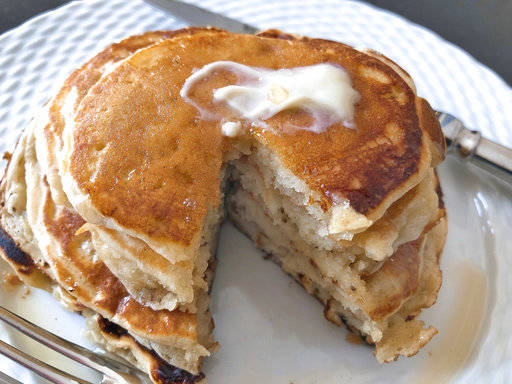I hate to throw over-ripe bananas away. It is such a wasted opportunity for fresh fragrant banana bread. But, there is only so much banana bread that one can eat. That is why I asked myself, what else can I make with over-ripe bananas?
And, since it was Sunday, banana pancakes popped into my head. I had never made banana pancakes with over-ripe bananas. I usually make them with slices of firm, slightly green bananas because that is how I like to eat fresh bananas. As it turned out, the over-ripe bananas are way better for pancakes.
I also wanted to try a pancake technique that a friend of mine swears by. You separate the egg and blend the yolk and the white into the batter at different times. It is supposed to make the pancakes lighter. I am not sure that it made that much difference but it is easy to do, doesn’t take any extra time like beating egg whites, and the resulting pancakes were light and fluffy and toothsome all at once.
The recipe is pretty basic with both sour milk and cream used as the liquid. I had cream on hand, but you could use half and half. I opted for cream because my milk was 2 percent and not whole milk. If I had had whole milk in the fridge, I would have used whole milk and half and half. I also soured my milk with white vinegar, but you could substitute buttermilk for the milk and vinegar combination.
A touch of nutmeg accented the ripe banana. I mashed the bananas as if I was making banana bread and added it to the batter right before I made the pancakes. The result was incredible—almost like banana bread pancakes. I love how the essence of banana was evident through the entire pancake but there were no discernable chunks of fruit.
Most pancake recipes instruct you to heat oil or melt butter in a skillet and “fry” the pancake. I prefer to cook them on a dry non-stick skillet so that they brown and bubble without any extra fat. If you do a side-by-side taste test, you can really see the difference. One looks like the top of a grilled quesadilla and the other resembles a baked good. The non-fried version is softer and more delicate in texture. The fried has a slightly crunchy top and is a bit greasy. Neither is right or wrong, it’s all a matter of preference.
It’s important to serve the pancakes with a good salted butter to bring out the banana flavor—I like Kate’s Homemade Butter or Kerrygold—and real maple syrup. Other good additions are mini chocolate chips, dried coconut, toasted walnuts and pecans. These pancakes are good for breakfast, but even better served as “Breakfast for Dinner” with a side of crispy bacon.
Ripe Banana Pancakes
Servings: 18 medium pancakes
Start to finish: 25 minutes
1 1/2 cups all-purpose flour
1 tablespoon granulated sugar
1/2 plus 1/4 teaspoon fine sea salt
1/2teaspoon baking powder
1/2teaspoon baking soda
1/8teaspoon ground nutmeg
1 large egg, separated
1 cup milk
1 tablespoon white vinegar
1/4cup cream or half and half
5 tablespoons unsalted butter, melted
1 ripe banana, mashed with a fork
Salted butter and real maple syrup for serving
Heat the oven to 250 F and set a sheet pan with a rack. Set aside
Whisk the flour, sugar, salt, baking powder, baking soda, and nutmeg together in a large bowl. Combine the milk and the vinegar in a 2-cup glass measuring cup and let sit 1-2 minutes. Add the egg yolk, and cream or half and half and mix well. Add the melted butter to the milk and egg yolk mixture and blend with a fork until well combined.
Pour the yolk and milk mixture into the flour mixture and stir with a blending fork until barely combined. Mix the egg white in a small bowl until slightly foamy and add the egg white to the batter. Stir just until a thick batter is formed. Set aside for 5 minutes.
Meanwhile, mash a ripe banana in a separate bowl. Just before cooking, combine the mashed banana and the pancake batter.
Heat a non-stick skillet over medium heat. When hot, use a spoon or a ladle to drop batter in heaping spoonfuls to the pan, allowing room for the batter to spread out. Unlike most recipes, I prefer not to “fry” the pancakes in oil or butter. I like a drier non-oily finish. If your skillet is non-stick, this will not be a problem.
Cook for about 1-2 minutes, depending on size. When the pancake begins to bubble, use a thin off-set spatula to gently flip to the other side. The pancake should be golden brown, if the heat is too high, the pancake will burn on the outside and be uncooked on the inside. Cook on the other side for another 2 minutes, or until the bottom of the pancake is golden brown.
Remove from the skillet to the baking sheet and place the sheet in the oven while you cook all the batter. Scrape any stray crumbs or scraps out of the skillet as you make the pancakes or the fresh pancakes will pick up the burned bits as they cook. Serve as soon as possible, with salted butter and maple syrup.
Chef’s Note: If cooking for a crowd, this recipe can be easily doubled and extra pancakes can be frozen and re-heated with very little difference in taste.
Nutrition information per pancake: 99 calories; 47 calories from fat; 5 g fat (3 g saturated; 0 g trans fats); 26 mg cholesterol; 145 mg sodium; 11 g carbohydrate; 1 g fiber; 2 g sugar; 2 g protein.
Elizabeth Karmel is a barbecue and Southern foods expert. She is the chef and pit master at online retailer CarolinaCueToGo.com and the author of three books, including “Taming the Flame.”

